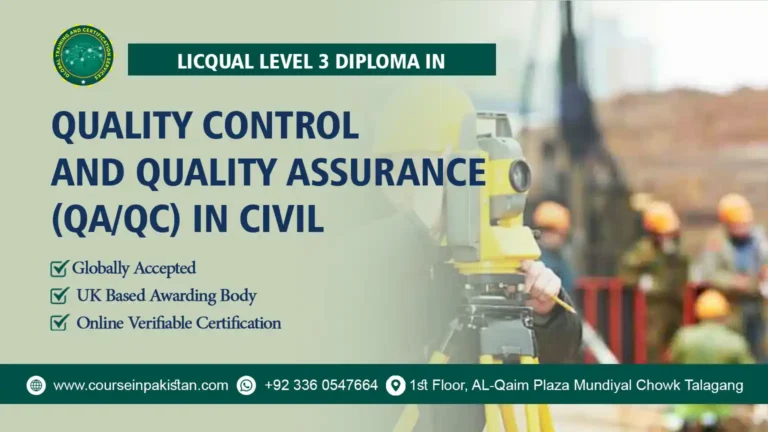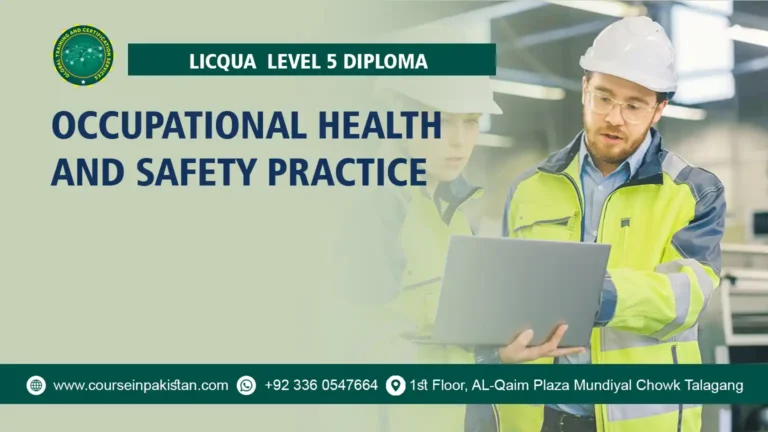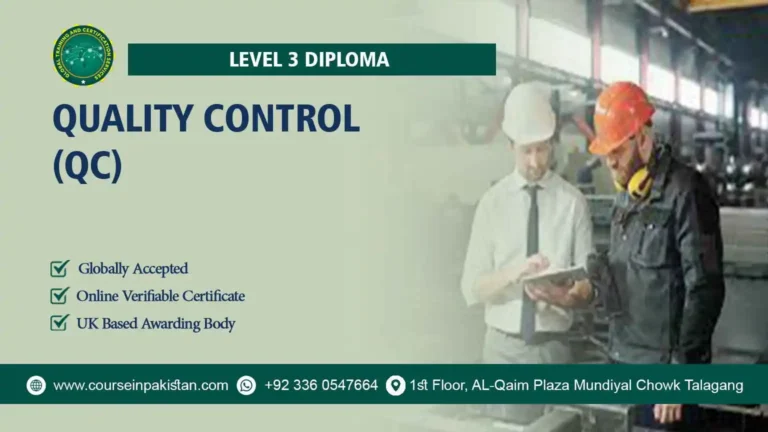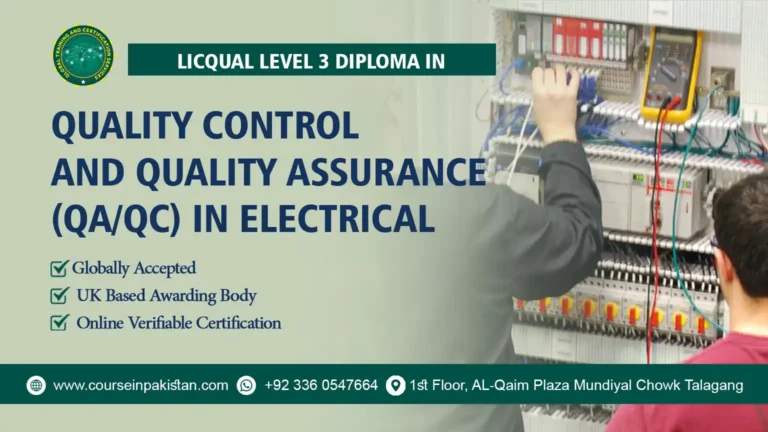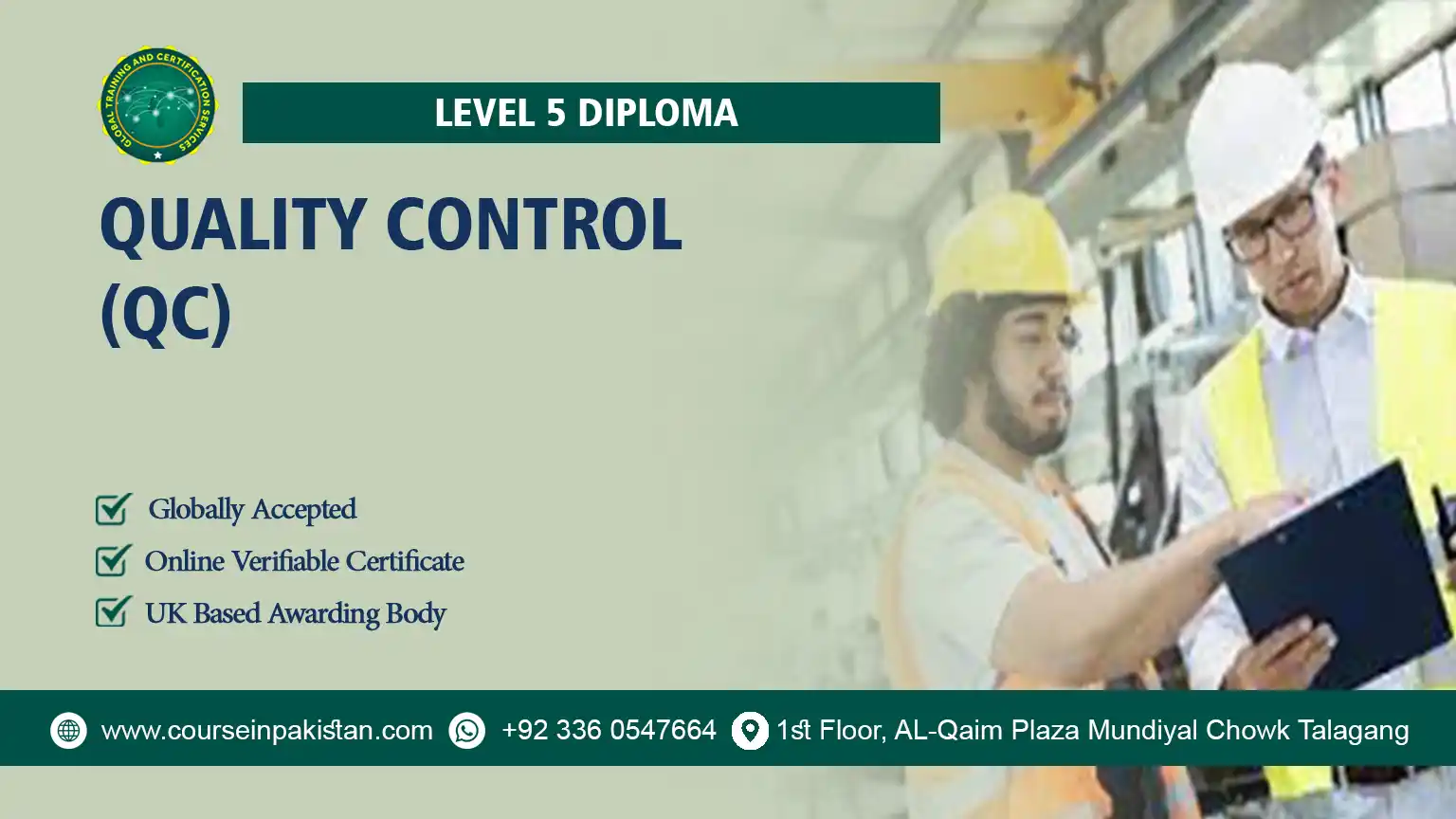
Level 5 Diploma in Quality Control (QC)
Quality control is a cornerstone of organizational success, ensuring products and services meet high standards of excellence. The Level 5 Diploma in Quality Control equips professionals with the essential skills and knowledge to lead quality initiatives, implement effective control measures, and drive continuous improvement within their organizations. This diploma program is designed for individuals aiming to advance their careers in quality management and make a significant impact in enhancing operational efficiency and customer satisfaction.
The Level 5 Diploma in Quality Control represents a comprehensive program focusing on the principles, methodologies, and strategic aspects of quality management. It prepares participants to navigate complex quality challenges, optimize processes, and uphold rigorous standards of quality assurance.
Course Benefits
- Enhanced Expertise: Gain in-depth knowledge and practical skills in quality control principles and methodologies.
- Career Advancement: Advance career prospects and open doors to roles such as Quality Assurance Supervisor, Quality Control Analyst, or Quality Improvement Specialist.
- Operational Efficiency: Contribute to organizational success by optimizing processes and ensuring high standards of product/service quality.
- Industry Recognition: Earn a respected diploma that demonstrates proficiency in quality control practices.
- Leadership Development: Develop leadership skills necessary to lead quality teams and drive continuous improvement initiatives.
Course Study Units
-
Experienced Quality Control Professionals
-
Mid-Level Managers and Supervisors
-
Industry Professionals
-
Entrepreneurs and Business Owners
-
Regulatory and Compliance Personnel
-
Continuous Improvement Enthusiasts
-
Academic and Training Institutions
-
Career Switchers
Learning Outcomes
Upon successful completion of the Level 5 Diploma in Quality Control, students will be able to:
Advanced Quality Management Systems
- Critically analyze advanced quality management frameworks and standards, including ISO 9001, ISO 14001, and ISO 45001.
- Integrate multiple quality management systems within an organization effectively.
- Plan, conduct, and report on audits for complex quality management systems.
Statistical Quality Control (SQC)
- Apply advanced statistical methods such as multivariate analysis and regression analysis to quality control processes.
- Design and implement experiments (DOE) to optimize processes.
- Utilize advanced statistical process control (SPC) tools, including control charts and process capability analysis, to monitor and improve quality.
Quality Systems Design and Implementation
- Design robust quality systems using key principles and methodologies.
- Implement quality systems in various organizational contexts using best practices.
- Develop and manage continuous improvement systems to support ongoing quality initiatives.
Strategic Quality Planning
- Employ advanced quality planning techniques to align quality activities with organizational goals.
- Identify, assess, and manage risks associated with quality control.
- Develop and manage strategic quality initiatives to drive organizational improvement.
Leadership and Change Management
- Demonstrate essential leadership skills for managing quality teams and initiatives.
- Apply effective change management techniques to quality processes and systems.
- Understand and leverage team dynamics and motivation strategies to enhance team performance.
Regulatory Compliance and Risk Management
- Analyze and interpret regulatory requirements across various industries.
- Develop and implement best practices for ensuring compliance with relevant standards and regulations.
- Apply advanced risk management techniques to identify and mitigate quality-related risks.
Advanced Quality Tools and Techniques
- Implement advanced Six Sigma methodologies, including DMAIC and DMADV processes, to improve quality.
- Apply lean principles to enhance quality and efficiency in organizational processes.
- Utilize total quality management (TQM) concepts and practices to achieve organizational excellence.
Supplier Quality Management
- Develop criteria and methods for advanced supplier selection and evaluation.
- Design and implement supplier development programs to improve supplier quality performance.
- Apply strategies for maintaining and improving relationships with suppliers.
Quality Innovation and Technology
- Foster innovation in quality control processes using advanced techniques.
- Utilize modern technologies, such as automation and data analytics, to enhance quality control.
- Leverage digital tools to transform and improve quality management systems.
Practical Applications and Case Studies
- Analyze complex quality control case studies from various industries to understand practical applications of advanced QC techniques.
- Apply advanced QC methodologies and tools through hands-on projects.
- Collaborate effectively with peers on group projects and present findings clearly and professionally.
The Level 5 Diploma in Quality Control is ideal for:
- Professionals aspiring to advance their careers in quality management and quality assurance roles.
- Individuals seeking to gain foundational knowledge and practical skills in quality control practices.
- Quality control technicians, inspectors, and coordinators looking to enhance their expertise and effectiveness in their roles.
Future Progression for This Course
After completing the Level 5 Diploma in Quality Control, participants can pursue further career development through:
- Advanced Certifications: Obtain specialized certifications such as Certified Quality Technician (CQT) or Certified Quality Improvement Associate (CQIA) to enhance credibility and expertise.
- Bachelor’s Degree Programs: Pursue a bachelor’s degree in Quality Management or related fields to further deepen knowledge and career prospects.
- Professional Development: Attend workshops, seminars, and conferences to stay updated on industry trends and advancements in quality control practices.
The Level 5 Diploma in Quality Control provides participants with a solid foundation in quality management principles, practical skills, and strategic insights essential for ensuring organizational excellence and competitiveness. Embrace this opportunity to advance your career and contribute to building a culture of quality within your organization.


